
San Francisco Bay Section (SFBS)
13 Results
-
Contains 4 Component(s), Includes Credits
This webinar will cover the principles, applications and basic troubleshooting techniques for the Ion Chromatography (IC) instrument.
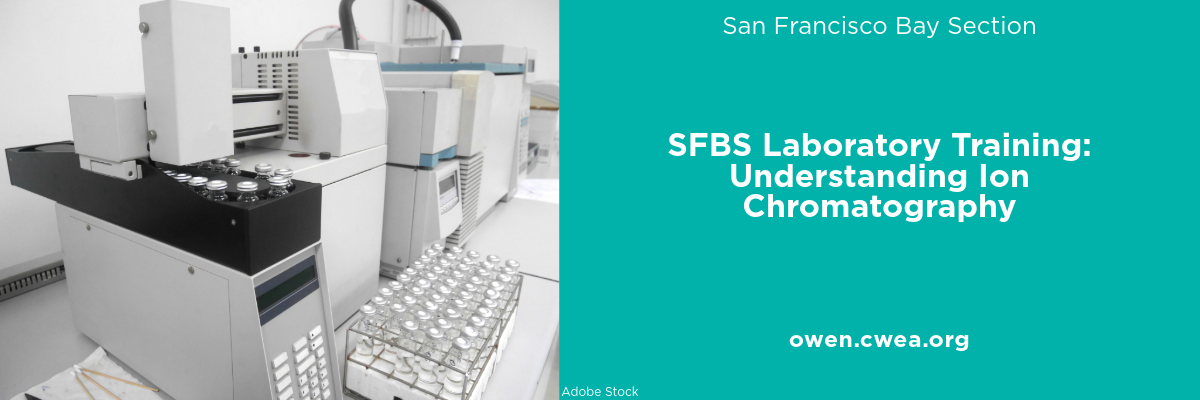
CWEA Members: $30.00
Non-Members: $40.001.2 Contact Hours Towards CWEA Certifications: LAB
Ion Chromatography (IC) is an instrument that can be used to detect a wide variety of analytes with one analytical process for aqueous matrices, and is commonly used for the analysis of anions (i.e., chloride, fluoride, nitrate, nitrite, sulfate) by EPA 300.1. This webinar will provide a basic overview of the IC for those studying for their CWEA Grades 2, 3, or 4 Laboratory Analyst Certification and more advanced operational tips and troubleshooting techniques for laboratory staff currently operating an IC.
Learning Objectives:
1. IC instrument theory
2. Calibrating the IC
3. Interpreting IC results/peaks
4. Basic IC troubleshootingBlake Brown (Moderator)
CWEA SF Bay Section Lab Committee Co-Chair
Central Contra Costa Sanitary District
Blake Brown is the CWEA SF Bay Section Lab Committee Co-Chair, the CWEA State Lab Committee Vice Chair of the North, and Laboratory Program Administrator at Central Contra Costa Sanitary District. She has 6 years of wastewater experience and has been volunteering with CWEA for 3 years.
Jay Sheffer
Product Specialist, Ion Chromatography
Metrohm USA
Jay Sheffer is a Product Specialist in Ion Chromatography with Metrohm USA. Jay has a BS in chemistry from Elon University and received his master's from Emory University. He has been with Metrohm USA for over a decade, beginning as an Applications Specialist focusing on ion chromatography and combustion IC and moving into his current IC Product Specialist role in 2017. Jay has over 20 years of experience in developing new products and applications for laboratory analysis. Jay has also been an active member with ASTM for 10 years and has developed several test methods using IC.
Registrants who view the live webinar to see the slides and hear the audio and then enter the correct attention check code (directions below) will receive 1.2 contact hours towards CWEA's certification: LAB.
To receive your contact hours for viewing the live webinar, please note the two (2) different attention check codes that will be displayed at two different points during the webinar in the top left or right corner of the presentation for approximately 90 seconds. Please enter these codes as 1st attention check code – 2nd attention check code (XXXX-XXXX) in the Attention Check Code component under the "Contents" tab.
Please note, all user activity of CWEA certification holders on the Online Wastewater Education Network is subject to the CWEA Code of Ethics standards for professional conduct and ethics. Certification holders should receive credit for a training only once within the same contact hour period. Any attempt to undermine the certification process may be subject to ethics procedures and possible sanctions. It is not possible to receive contact hours for both attending the live webinar and viewing the recording.
Once you have entered the correct attendance check codes, you will be able to create and download an electronic certificate of completion under the "Contents" tab.
-
You must log in to register
- Non-member - $40
- Member - $30
- More Information
-
You must log in to register
-
Contains 4 Component(s), Includes Credits
This webinar is an overview of the microorganisms and the biochemistry responsible for phosphorus removal in wastewater.
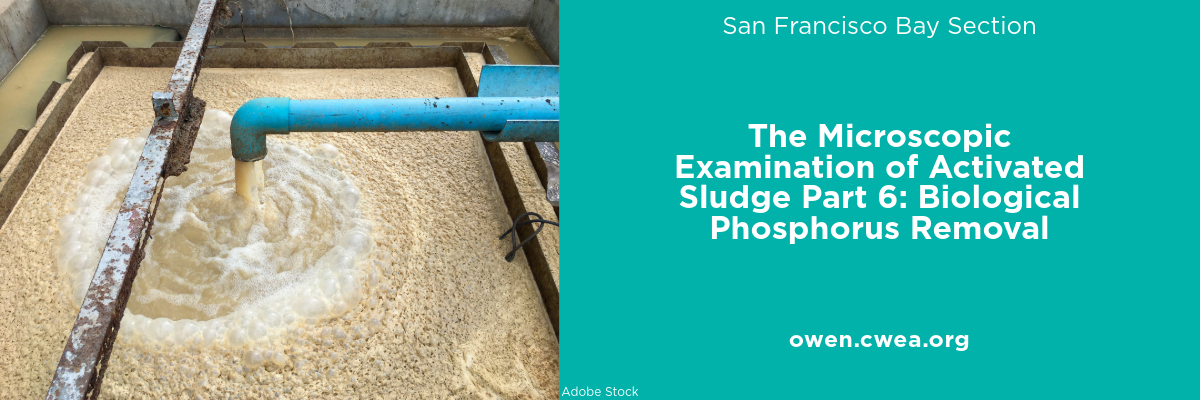
CWEA Members: $25.00
Non-Members: $35.001.2 Contact Hours Towards CWEA Certifications: LAB & AWTO
This webinar is part 6 of an educational series hosted by the SFBS Laboratory Committee on the use of a microscope to make more informed process control decisions. In this webinar our speaker, Ron Trygar, will cover the microorganisms responsible for phosphorus removal, the conditions suitable to their well-being, and the methods used for phosphorus removal.
• Learning Objectives/Attendee Takeaways
o No. 1 Learn about the specific microorganisms responsible for phosphorus removal in wastewater
o No. 2 Overview of the conditions and environments suitable for these microorganisms growth and well-being
o No. 3 Overview of the Selectors and Operational Methods used for phosphorus removal
o No. 4 Using the Microscope for TroubleshootingBlake Brown (Moderator)
CWEA SF Bay Section Lab Committee Co-Chair
Central Contra Costa Sanitary District
Blake Brown is the CWEA SF Bay Section Lab Committee Co-Chair, the CWEA State Lab Committee Vice Chair of the North, and Laboratory Program Administrator at Central Contra Costa Sanitary District. She has 6 years of wastewater experience and has been volunteering with CWEA for 3 years.
Ron Trygar, CET
Senior Training Specialist
University of Florida Training, Research and Education for Environmental Occupations (TREEO) Center
Ron Trygar has been in the wastewater treatment industry for more than 39 years, and he is the Senior Training Specialist at the University of Florida Training, Research and Education for Environmental Occupations (TREEO) Center in Gainesville, Florida. Ron has over 25 years of training experience, and he is passionate about teaching wastewater treatment courses, specifically the microscopic examination of activated sludge. Ron has spent many hours observing the biomass from his own treatment plants as well as samples sent to him from treatment plants around the Southeastern US, and he is considered a subject matter expert by his peers in Florida. Ron is certified in Florida as a Class A Wastewater Treatment Plant Operator and Class B Drinking Water Plant Operator and holds a certification through the Southeast Desalting Association (SEDA) as a Membrane Treatment Plant Operator. In his free time, Ron enjoys fishing, swimming and diving along Florida’s marine coastline, fixing cars and stuff in his workshop, reading and spending time with his wife Rochelle.
Registrants who view the live webinar to see the slides and hear the audio and then enter the correct attention check code (directions below) will receive 1.2 contact hours towards CWEA's certification: LAB & AWTO.
To receive your contact hours for viewing the live webinar, please note the two (2) different attention check codes that will be displayed at two different points during the webinar in the top left or right corner of the presentation for approximately 90 seconds. Please enter these codes as 1st attention check code – 2nd attention check code (XXXX-XXXX) in the Attention Check Code component under the "Contents" tab.
Please note, all user activity of CWEA certification holders on the Online Wastewater Education Network is subject to the CWEA Code of Ethics standards for professional conduct and ethics. Certification holders should receive credit for a training only once within the same contact hour period. Any attempt to undermine the certification process may be subject to ethics procedures and possible sanctions. It is not possible to receive contact hours for both attending the live webinar and viewing the recording.
Once you have entered the correct attendance check codes, you will be able to create and download an electronic certificate of completion under the "Contents" tab.
-
You must log in to register
- Non-member - $40
- Member - $30
- More Information
-
You must log in to register
-
Contains 4 Component(s), Includes Credits
This webinar is an in-depth discussion about how to use the microscope to examine and interpret your activated sludge floc particles.
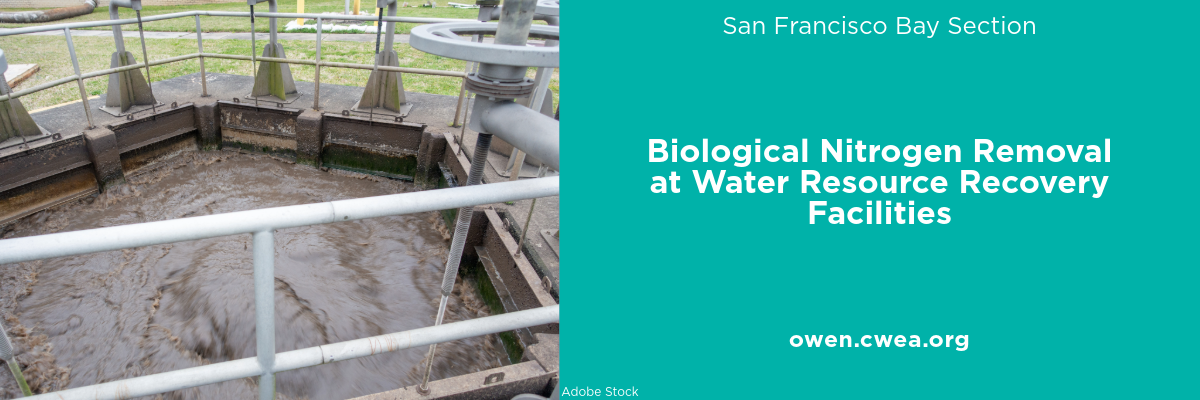
CWEA Members: $25.00
Non-Members: $35.001.2 Contact Hours Towards CWEA Certifications: LAB, AWTO
This webinar is part 5 of an educational series hosted by the SFBS Laboratory Committee on the use of a microscope to make more informed process control decisions. In this webinar our speaker, Ron Trygar, will cover the microorganisms responsible for nitrogen removal, the conditions suitable to their well-being, and the methods used for nitrogen removal.
• Learning Objectives/Attendee Takeaways
o No. 1 Learn about the specific microorganisms responsible for nitrogen removal in wastewater
o No. 2 Overview of the conditions and environments suitable for these microorganisms growth and well-being
o No. 3 Overview of the Selectors and Operational Methods used for nitrogen removal
o No. 4 Using the Microscope for TroubleshootingBlake Brown (Moderator)
CWEA SF Bay Section Lab Committee Co-Chair
Central Contra Costa Sanitary District
Blake Brown is the CWEA SF Bay Section Lab Committee Co-Chair, the CWEA State Lab Committee Vice Chair of the North, and Laboratory Program Administrator at Central Contra Costa Sanitary District. She has 6 years of wastewater experience and has been volunteering with CWEA for 3 years.
Ron Trygar, CET
Senior Training Specialist
University of Florida Training, Research and Education for Environmental Occupations (TREEO) Center
Ron Trygar has been in the wastewater treatment industry for more than 39 years, and he is the Senior Training Specialist at the University of Florida Training, Research and Education for Environmental Occupations (TREEO) Center in Gainesville, Florida. Ron has over 25 years of training experience, and he is passionate about teaching wastewater treatment courses, specifically the microscopic examination of activated sludge. Ron has spent many hours observing the biomass from his own treatment plants as well as samples sent to him from treatment plants around the Southeastern US, and he is considered a subject matter expert by his peers in Florida. Ron is certified in Florida as a Class A Wastewater Treatment Plant Operator and Class B Drinking Water Plant Operator and holds a certification through the Southeast Desalting Association (SEDA) as a Membrane Treatment Plant Operator. In his free time, Ron enjoys fishing, swimming and diving along Florida’s marine coastline, fixing cars and stuff in his workshop, reading and spending time with his wife Rochelle.
Registrants who view the live webinar to see the slides and hear the audio and then enter the correct attention check code (directions below) will receive 1.2 contact hours towards CWEA's certification: LAB, AWTO
To receive your contact hours for viewing the live webinar, please note the two (2) different attention check codes that will be displayed at two different points during the webinar in the top left or right corner of the presentation for approximately 90 seconds. Please enter these codes as 1st attention check code – 2nd attention check code (XXXX-XXXX) in the Attention Check Code component under the "Contents" tab.
Please note, all user activity of CWEA certification holders on the Online Wastewater Education Network is subject to the CWEA Code of Ethics standards for professional conduct and ethics. Certification holders should receive credit for a training only once within the same contact hour period. Any attempt to undermine the certification process may be subject to ethics procedures and possible sanctions. It is not possible to receive contact hours for both attending the live webinar and viewing the recording.
Once you have entered the correct attendance check codes, you will be able to create and download an electronic certificate of completion under the "Contents" tab.
-
You must log in to register
- Non-member - $40
- Member - $30
- More Information
-
You must log in to register
-
Contains 4 Component(s), Includes Credits Recorded On: 11/29/2023
This webinar is an in-depth training on using your microscope to interpret the effects that Protozoa and Metazoa create in your activated sludge.
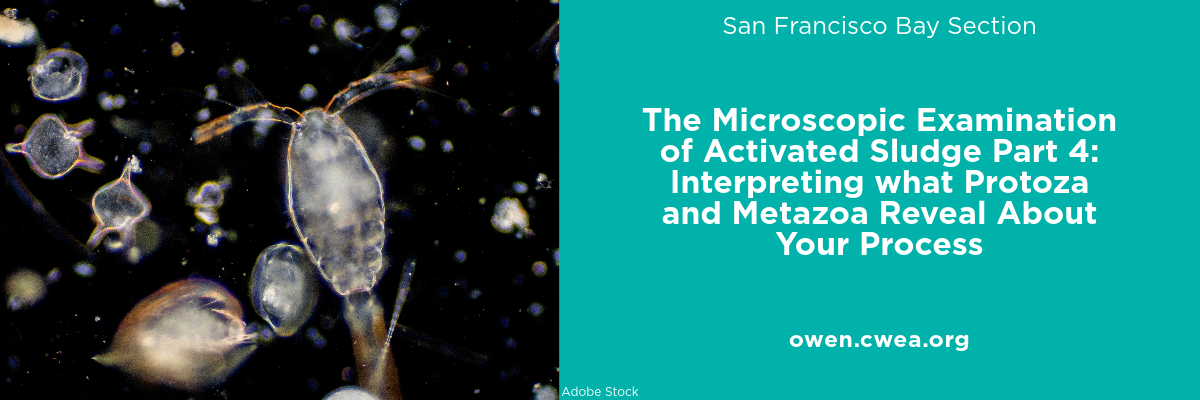
CWEA Members: $25.00
Non-Members: $35.001.2 Contact Hours Towards CWEA Certifications: LAB
This webinar is part 4 of an educational series hosted by the SFBS Laboratory Committee on the use of a microscope to examine the WWTP’s activated sludge and make more informed process control decisions. In this webinar our speaker, Ron Trygar, will cover identifying Protozoa and Metazoa and what their presence reveals about your activated sludge and the effectiveness of your process.
• Learning Objectives/Attendee Takeaways
o No. 1 Identifying Protozoa and Metazoa and their dominance in MLSS
o No. 2 Interpreting results based on the dominant microorganisms
o No. 3 Process control adjustments based on microorganism trendsBlake Brown (Moderator)
CWEA SF Bay Section Lab Committee Co-Chair
Central Contra Costa Sanitary District
Blake Brown is the CWEA SF Bay Section Lab Committee Co-Chair, the CWEA State Lab Committee Vice Chair of the North, and Laboratory Program Administrator at Central Contra Costa Sanitary District. She has 6 years of wastewater experience and has been volunteering with CWEA for 3 years.
Ron Trygar, CET
Senior Training Specialist
University of Florida Training, Research and Education for Environmental Occupations (TREEO) Center
Ron Trygar has been in the wastewater treatment industry for more than 39 years, and he is the Senior Training Specialist at the University of Florida Training, Research and Education for Environmental Occupations (TREEO) Center in Gainesville, Florida. Ron has over 25 years of training experience, and he is passionate about teaching wastewater treatment courses, specifically the microscopic examination of activated sludge. Ron has spent many hours observing the biomass from his own treatment plants as well as samples sent to him from treatment plants around the Southeastern US, and he is considered a subject matter expert by his peers in Florida. Ron is certified in Florida as a Class A Wastewater Treatment Plant Operator and Class B Drinking Water Plant Operator and holds a certification through the Southeast Desalting Association (SEDA) as a Membrane Treatment Plant Operator. In his free time, Ron enjoys fishing, swimming and diving along Florida’s marine coastline, fixing cars and stuff in his workshop, reading and spending time with his wife Rochelle.
Registrants who view the live webinar to see the slides and hear the audio and then enter the correct attention check code (directions below) will receive 1.2 contact hours towards CWEA's certification: LAB.
To receive your contact hours for viewing the live webinar, please note the two (2) different attention check codes that will be displayed at two different points during the webinar in the top left or right corner of the presentation for approximately 90 seconds. Please enter these codes as 1st attention check code – 2nd attention check code (XXXX-XXXX) in the Attention Check Code component under the "Contents" tab.
Please note, all user activity of CWEA certification holders on the Online Wastewater Education Network is subject to the CWEA Code of Ethics standards for professional conduct and ethics. Certification holders should receive credit for a training only once within the same contact hour period. Any attempt to undermine the certification process may be subject to ethics procedures and possible sanctions. It is not possible to receive contact hours for both attending the live webinar and viewing the recording.
Once you have entered the correct attendance check codes, you will be able to create and download an electronic certificate of completion under the "Contents" tab.
-
You must log in to register
- Non-member - $35
- Member - $25
- More Information
-
You must log in to register
-
Contains 4 Component(s), Includes Credits Recorded On: 11/14/2023
This webinar will focus on the hexane extractable materials (HEM) analysis of wastewater samples and give troubleshooting advice for EPA method 1664 (A or B) and SM 5520 B/F-2011.
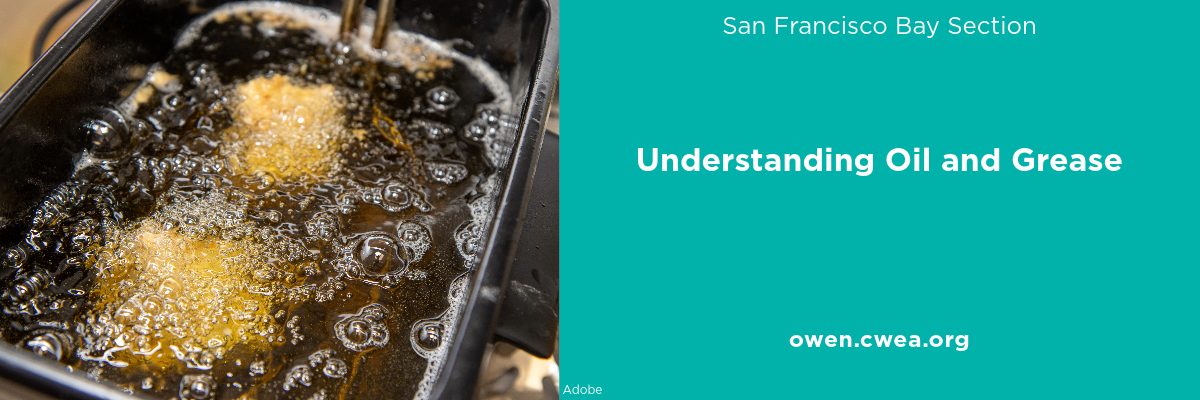
CWEA Members: $25.00
Non-Members: $35.001.2 Contact Hours Towards CWEA Certifications: LAB
This webinar, hosted by the SFBS CWEA Laboratory Committee, will focus on the analysis of Oil and Grease in wastewater samples. In this webinar our speaker, David Smith, will provide a technical background of the analysis and discuss tips and tricks to troubleshoot the analysis.
• Learning Objectives/Attendee Takeaways
o No. 1 FOG Method and Procedure Overview
o No. 2 Common FOG Issues
o No. 3 FOG Troubleshooting Tips and TricksBlake Brown (Moderator)
CWEA SF Bay Section Lab Committee Co-Chair
Central Contra Costa Sanitary District
Blake Brown is the CWEA SF Bay Section Lab Committee Co-Chair, the CWEA State Lab Committee Vice Chair of the North, and Laboratory Program Administrator at Central Contra Costa Sanitary District. She has 6 years of wastewater experience and has been volunteering with CWEA for 3 years.
David Smith
Lead, Technical Support
Environmental Express
David holds a Bachelor of Science degree in Chemistry from the University of South Carolina. He began his career in the environmental field as an analyst in the wet chemistry department with an environmental lab in Columbia, South Carolina. He moved up to the role of department supervisor and served in that position for 7 years. David then joined Environmental Express where he now works as lead technical support. His primary roles include helping others with proper utilization of their equipment, internal and external method training, and working with product development. He has volunteered with the Standard Methods Committee since 2008. He has also volunteered with TNI since 2017. When not working on Environmental Chemistry he spends his time with his family, piano, woodworking, volleyball, and reading epic fantasy series.
Registrants who view the live webinar to see the slides and hear the audio and then enter the correct attention check code (directions below) will receive 1.2 contact hours towards CWEA's certification: LAB.
To receive your contact hours for viewing the live webinar, please note the two (2) different attention check codes that will be displayed at two different points during the webinar in the top left or right corner of the presentation for approximately 90 seconds. Please enter these codes as 1st attention check code – 2nd attention check code (XXXX-XXXX) in the Attention Check Code component under the "Contents" tab.
Please note, all user activity of CWEA certification holders on the Online Wastewater Education Network is subject to the CWEA Code of Ethics standards for professional conduct and ethics. Certification holders should receive credit for a training only once within the same contact hour period. Any attempt to undermine the certification process may be subject to ethics procedures and possible sanctions. It is not possible to receive contact hours for both attending the live webinar and viewing the recording.
Once you have entered the correct attendance check codes, you will be able to create and download an electronic certificate of completion under the "Contents" tab.
-
You must log in to register
- Non-member - $35
- Member - $25
- More Information
-
You must log in to register
-
Contains 4 Component(s), Includes Credits Recorded On: 11/02/2023
This webinar, hosted by the SFBS CWEA Laboratory Committee, will focus on the analysis of samples for low-level metals.
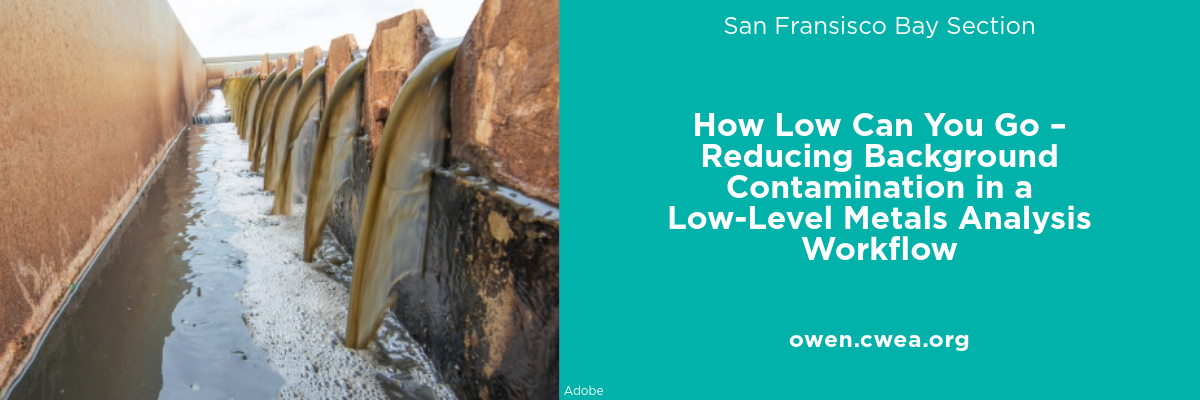
CWEA Members: $25.00
Non-Members: $35.001.2 Contact Hours Towards CWEA Certifications: LAB
Regulatory entities, along with competitive markets, are driving the demand for lower and lower detection levels of samples. When it comes to achieving low detection capabilities for metals testing, laboratories recognize not only the importance but also the difficulties associated with keeping a clean lab and clean testing supplies. In this webinar, our speaker Becky Faenza, will discuss common sources of background contamination in the laboratory and ways to navigate through a clean lab workflow to achieve low detection capabilities in low-level metals analysis.
Blake Brown (Moderator)
CWEA SF Bay Section Lab Committee Co-Chair
Central Contra Costa Sanitary District
Blake Brown is the CWEA SF Bay Section Lab Committee Co-Chair, the CWEA State Lab Committee Vice Chair of the North, and Laboratory Program Administrator at Central Contra Costa Sanitary District. She has 6 years of wastewater experience and has been volunteering with CWEA for 3 years.
Becky Faenza
Representative, Technical Support
Environmental Express
Becky Faenza has worked at Environmental Express as a Technical Specialist for the past 7 years. Prior to her current position she worked in the Biodiesel Industry for 4 years. She received a B.S. degree in both Biology and Marine/Environmental Science from Salisbury University and a M.S. degree in Environmental Studies from the College of Charleston.
Registrants who view the live webinar to see the slides and hear the audio and then enter the correct attention check code (directions below) will receive 1.2 contact hours towards CWEA's certification: LAB.
To receive your contact hours for viewing the live webinar, please note the two (2) different attention check codes that will be displayed at two different points during the webinar in the top left or right corner of the presentation for approximately 90 seconds. Please enter these codes as 1st attention check code – 2nd attention check code (XXXX-XXXX) in the Attention Check Code component under the "Contents" tab.
Please note, all user activity of CWEA certification holders on the Online Wastewater Education Network is subject to the CWEA Code of Ethics standards for professional conduct and ethics. Certification holders should receive credit for a training only once within the same contact hour period. Any attempt to undermine the certification process may be subject to ethics procedures and possible sanctions. It is not possible to receive contact hours for both attending the live webinar and viewing the recording.
Once you have entered the correct attendance check codes, you will be able to create and download an electronic certificate of completion under the "Contents" tab.
-
You must log in to register
- Non-member - $35
- Member - $25
- More Information
-
You must log in to register
-
Contains 4 Component(s), Includes Credits Recorded On: 09/12/2023
This webinar will focus on the BOD analysis of wastewater samples and provide troubleshooting advice for SM 5210 B.
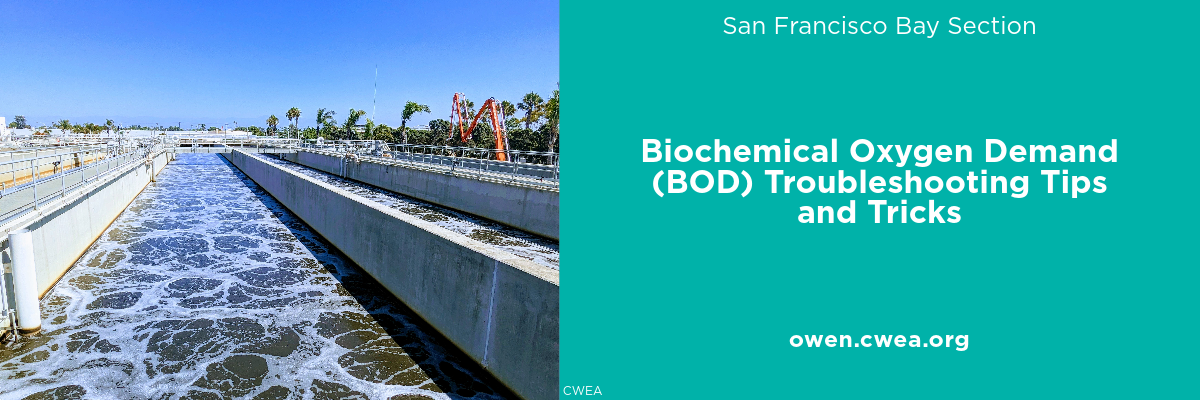
CWEA Members: $25.00
Non-Members: $35.001.2 Contact Hours Towards CWEA Certifications: LAB
This webinar, hosted by the SFBS CWEA Laboratory Committee, will focus on the Biochemical Oxygen Demand (BOD) analysis of wastewater samples. In this webinar our speaker, David Smith, will discuss tips and tricks to troubleshoot the BOD analysis and outline products offered for the BOD analysis from Environmental Express.
• Learning Objectives/Attendee Takeaways
o No. 1 BOD Method and Procedure Overview
o No. 2 Common BOD Issues
o No. 3 BOD Troubleshooting Tips and TricksBlake Brown (Moderator)
CWEA SF Bay Section Lab Committee Co-Chair
Central Contra Costa Sanitary District
Blake Brown is the CWEA SF Bay Section Lab Committee Co-Chair, the CWEA State Lab Committee Vice Chair of the North, and Laboratory Program Administrator at Central Contra Costa Sanitary District. She has 6 years of wastewater experience and has been volunteering with CWEA for 3 years.
David Smith
Lead, Technical Support
Environmental Express
David holds a Bachelor of Science degree in Chemistry from the University of South Carolina. He began his career in the environmental field as an analyst in the wet chemistry department with an environmental lab in Columbia, South Carolina. He moved up to the role of department supervisor and served in that position for 7 years. David then joined Environmental Express where he now works as lead technical support. His primary roles include helping others with proper utilization of their equipment, internal and external method training, and working with product development. He has volunteered with the Standard Methods Committee since 2008. He has also volunteered with TNI since 2017. When not working on Environmental Chemistry he spends his time with his family, piano, woodworking, volleyball, and reading epic fantasy series.
Registrants who view the live webinar to see the slides and hear the audio and then enter the correct attention check code (directions below) will receive 1.2 contact hours towards CWEA's certification: LAB, AWTO
To receive your contact hours for viewing the live webinar, please note the two (2) different attention check codes that will be displayed at two different points during the webinar in the top left or right corner of the presentation for approximately 90 seconds. Please enter these codes as 1st attention check code – 2nd attention check code (XXXX-XXXX) in the Attention Check Code component under the "Contents" tab.
Please note, all user activity of CWEA certification holders on the Online Wastewater Education Network is subject to the CWEA Code of Ethics standards for professional conduct and ethics. Certification holders should receive credit for a training only once within the same contact hour period. Any attempt to undermine the certification process may be subject to ethics procedures and possible sanctions. It is not possible to receive contact hours for both attending the live webinar and viewing the recording.
Once you have entered the correct attendance check codes, you will be able to create and download an electronic certificate of completion under the "Contents" tab.
-
You must log in to register
- Non-member - $35
- Member - $25
- More Information
-
You must log in to register
-
Contains 4 Component(s), Includes Credits
This webinar is an in-depth training on using your microscope to identify filament characteristics in your activated sludge.
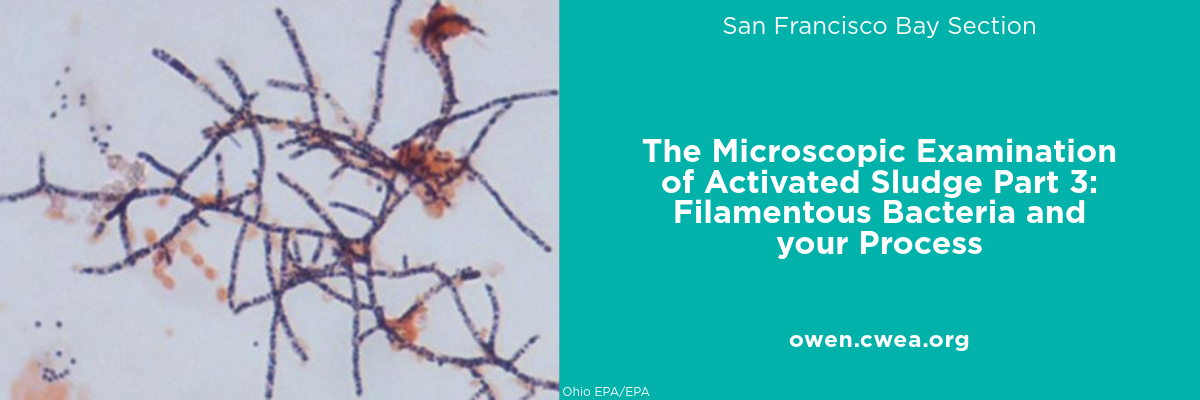
CWEA Members: $25.00
Non-Members: $35.001.2 Contact Hours Towards CWEA Certifications: LAB, AWTO
This webinar is part 3 of an educational series hosted by the SFBS Laboratory Committee on the use of a microscope to examine the WWTP’s activated sludge and make more informed process control decisions. In this webinar our speaker, Ron Trygar, will cover identifying filament characteristics and their impact on the settling properties of your activated sludge.
• Learning Objectives/Attendee Takeaways
o No. 1 Identifying filament characteristics
o No. 2 Interpreting results provided by a microscopic exam of the activated sludge
o No. 3 Process control adjustments based on filament identificationBlake Brown (Moderator)
CWEA SF Bay Section Lab Committee Co-Chair
Central Contra Costa Sanitary District
Blake Brown is the CWEA SF Bay Section Lab Committee Co-Chair, the CWEA State Lab Committee Vice Chair of the North, and Laboratory Program Administrator at Central Contra Costa Sanitary District. She has 6 years of wastewater experience and has been volunteering with CWEA for 3 years.
Ron Trygar, CET
Senior Training Specialist
University of Florida Training, Research and Education for Environmental Occupations (TREEO) Center
Ron Trygar has been in the wastewater treatment industry for more than 39 years, and he is the Senior Training Specialist at the University of Florida Training, Research and Education for Environmental Occupations (TREEO) Center in Gainesville, Florida. Ron has over 25 years of training experience, and he is passionate about teaching wastewater treatment courses, specifically the microscopic examination of activated sludge. Ron has spent many hours observing the biomass from his own treatment plants as well as samples sent to him from treatment plants around the Southeastern US, and he is considered a subject matter expert by his peers in Florida. Ron is certified in Florida as a Class A Wastewater Treatment Plant Operator and Class B Drinking Water Plant Operator and holds a certification through the Southeast Desalting Association (SEDA) as a Membrane Treatment Plant Operator. In his free time, Ron enjoys fishing, swimming and diving along Florida’s marine coastline, fixing cars and stuff in his workshop, reading and spending time with his wife Rochelle.
Registrants who view the live webinar to see the slides and hear the audio and then enter the correct attention check code (directions below) will receive 1.2 contact hours towards CWEA's certification: LAB, AWTO
To receive your contact hours for viewing the live webinar, please note the two (2) different attention check codes that will be displayed at two different points during the webinar in the top left or right corner of the presentation for approximately 90 seconds. Please enter these codes as 1st attention check code – 2nd attention check code (XXXX-XXXX) in the Attention Check Code component under the "Contents" tab.
Please note, all user activity of CWEA certification holders on the Online Wastewater Education Network is subject to the CWEA Code of Ethics standards for professional conduct and ethics. Certification holders should receive credit for a training only once within the same contact hour period. Any attempt to undermine the certification process may be subject to ethics procedures and possible sanctions. It is not possible to receive contact hours for both attending the live webinar and viewing the recording.
Once you have entered the correct attendance check codes, you will be able to create and download an electronic certificate of completion under the "Contents" tab.
-
You must log in to register
- Non-member - $35
- Member - $25
- More Information
-
You must log in to register
-
Contains 4 Component(s), Includes Credits
This webinar is an in-depth discussion about how to use the microscope to examine and interpret your activated sludge floc particles.
CWEA Members: $25.00
Non-Members: $35.001.2 Contact Hours Towards CWEA Certifications: LAB, AWTO
This webinar is part 2 of an educational series hosted by the SFBS Laboratory Committee on the use of a microscope to examine the WWTP’s activated sludge and make more informed process control decisions. During this webinar our speaker, Ron Trygar, will cover floc structure and its impact on the settling properties of your activated sludge.
• Learning Objectives/Attendee Takeaways
o No. 1 Identifying floc morphology
o No. 2 Factors that impact biological flocculation
o No. 3 Interpreting results provided by a microscopic exam of the activated sludgeBlake Brown (Moderator)
CWEA SF Bay Section Lab Committee Co-Chair
Central Contra Costa Sanitary District
Blake Brown is the CWEA SF Bay Section Lab Committee Co-Chair, the CWEA State Lab Committee Vice Chair of the North, and Laboratory Program Administrator at Central Contra Costa Sanitary District. She has 6 years of wastewater experience and has been volunteering with CWEA for 3 years.
Ron Trygar, CET
Senior Training Specialist
University of Florida Training, Research and Education for Environmental Occupations (TREEO) Center
Ron Trygar has been in the wastewater treatment industry for more than 39 years, and he is the Senior Training Specialist at the University of Florida Training, Research and Education for Environmental Occupations (TREEO) Center in Gainesville, Florida. Ron has over 25 years of training experience, and he is passionate about teaching wastewater treatment courses, specifically the microscopic examination of activated sludge. Ron has spent many hours observing the biomass from his own treatment plants as well as samples sent to him from treatment plants around the Southeastern US, and he is considered a subject matter expert by his peers in Florida. Ron is certified in Florida as a Class A Wastewater Treatment Plant Operator and Class B Drinking Water Plant Operator and holds a certification through the Southeast Desalting Association (SEDA) as a Membrane Treatment Plant Operator. In his free time, Ron enjoys fishing, swimming and diving along Florida’s marine coastline, fixing cars and stuff in his workshop, reading and spending time with his wife Rochelle.
Registrants who view the live webinar to see the slides and hear the audio and then enter the correct attention check code (directions below) will receive 1.2 contact hours towards CWEA's certification: LAB, AWTO
To receive your contact hours for viewing the live webinar, please note the two (2) different attention check codes that will be displayed at two different points during the webinar in the top left or right corner of the presentation for approximately 90 seconds. Please enter these codes as 1st attention check code – 2nd attention check code (XXXX-XXXX) in the Attention Check Code component under the "Contents" tab.
Please note, all user activity of CWEA certification holders on the Online Wastewater Education Network is subject to the CWEA Code of Ethics standards for professional conduct and ethics. Certification holders should receive credit for a training only once within the same contact hour period. Any attempt to undermine the certification process may be subject to ethics procedures and possible sanctions. It is not possible to receive contact hours for both attending the live webinar and viewing the recording.
Once you have entered the correct attendance check codes, you will be able to create and download an electronic certificate of completion under the "Contents" tab.
-
You must log in to register
- Non-member - $35
- Member - $25
- More Information
-
You must log in to register
-
Contains 4 Component(s), Includes Credits Recorded On: 09/28/2021
LABS of CWEA and Engineering & Research Committee Series Webinar
Member fee: $25.00
Non-Member fee: $35.001.2 contact hours towards CWEA's certifications: ECI, LAB.
Ozone combined with Biological Activated Carbon is emerging as a valuable component of a potable reuse treatment train. This webinar will present examples of the use of this process in indirect potable reuse systems on both coasts. The key examples featured in the webinar are Hampton Roads Sanitation Districts SWIFT program and the City of San Diego’s Pure Water program.
Key learning objectives:
• An approach to indirect potable reuse treatment without reverse osmosis
• Drivers for use of ozone/biological activated carbon in potable reuse
• Keys to success in using ozone/biological activated carbon in potable reuse
Fred Gerringer P.E (Moderator)
Hazen and Sawyer
Mitchel Bartolo, P.E.
Trussell Technologies, Inc.
Mitchel Bartolo has a B.S. in Environmental Engineering Science from the University of California at Berkeley and a M.S.E. in Environmental and Water Resources Engineering from the University of Texas at Austin. His Master’s thesis work with Dr. Lynn Katz and Dr. Desmond Lawler was part of an EPA Small Water Systems project investigating alum coagulation in drinking water with respect to fluoride and natural organic matter removal. Mr. Bartolo has past experience working with the City of San Diego Storm Water Division and the Oro Loma Sanitary District where he was involved with several water quality and wastewater treatment design projects. Mr. Bartolo’s current work has contributed to several aspects of potable reuse projects in the San Diego area including engineering design reports, Title 22 Engineering Reports, pathogen studies, evaluation of treatment train water quality, and various components of treatment process design. His general interests include water and wastewater treatment, water reuse, and the realization of sustainable water resources in California. Mr. Bartolo is currently a member of the American Chemical Society, the American Academy of Environmental Engineers and Scientists, and the American Water Works Association.

Jamie Mitchell
Hampton Roads Sanitation District
To receive your contact hours for viewing the live webinar, please note different attention check code(s) that will be displayed at two different points during the webinar in the top left or right corner of the presentation for approximately 90 seconds. Please enter these codes as in the Attention Check Code component under the "Contents" tab.
Please note, all user activity of CWEA certification holders on the Online Wastewater Education Network is subject to the CWEA Code of Ethics standards for professional conduct and ethics. Certification holders should receive credit for a training only once within the same contact hour period. Any attempt to undermine the certification process may be subject to ethics procedures and possible sanctions. It is not possible to receive contact hours for both attending the live webinar and viewing the recording.
Once you have entered the correct attendance check codes, you will be able to create and download an electronic certificate of completion under the "Contents" tab.
-
You must log in to register
- Non-member - $35
- Member - $25
- More Information
-
You must log in to register
-
Contains 4 Component(s), Includes Credits Recorded On: 06/24/2021
Please join LABS for our 5th virtual presentation to learn how the Las Virgenes – Triunfo Joint Power Authority (JPA), with PACE Advanced Water Engineering serving as the engineering consultant, led a process air improvement project at the 12 MGD Tapia Water Reclamation Facility (WRF) to improve energy efficiency and reduce operational costs.
Member fee: $25.00
Non-Member fee: $35.001.2 contact hours towards CWEA's Electrical / Instrumentation Technician, and Mechanical Technologist certifications
To improve energy efficiency and reduce operational costs, the Las Virgenes – Triunfo Joint Power Authority (JPA) with PACE Advanced Water Engineering serving as the engineering consultant, led a process air improvement project at the 12 MGD Tapia Water Reclamation Facility (WRF). The improvements included adding over 60 retrievable, fine bubble aeration grids, three 400HP magnetic-bearing turbine blowers, converting 4160 medium voltage electrical gear down to 480V, and SCADA/controls integration to optimize process controls. These improvements reduced energy consumption by almost 40%. Additionally, the JPA used a specialized equipment procurement process known as Performance-Based Specifications during the design phase yielding a capital cost savings of 30%. As a result, the community benefits from a reasonable capital expense outlay with a return on investment of less than six years, with an estimated $2.5M savings over the new system’s 20-year expected life.
John Zhao, PE
Director of Facilities and Operations
Las Virgenes Municipal Water District
John Zhao has been with the Las Virgenes Municipal Water District for the last 15 years. He served as a Principal Engineer and currently as the Director of Facilities and Operations to provide wastewater treatment and recycled water Distribution, Potable water treatment and distribution, and composting operations to approximately 90,000 people in western Los Angeles County and eastern Ventura County.

Duong Do, PE
Vice President
Environmental Water
Duong Do is a technical expert in civil and environmental engineering with experience spanning back to 1996. As a Vice-President of the Environmental Water Division, his current responsibilities include managing the design and engineering of water and wastewater treatment, storage, and conveyance projects. Mr. Do has served as the Engineer-of-Record and Project Manager for numerous wastewater treatment projects throughout the Southwestern U.S., including several award-winning facilities.
To receive your contact hours for viewing the live webinar, please note different attention check code(s) that will be displayed at two different points during the webinar in the top left or right corner of the presentation for approximately 90 seconds. Please enter these codes as in the Attention Check Code component under the "Contents" tab.
Please note, all user activity of CWEA certification holders on the Online Wastewater Education Network is subject to the CWEA Code of Ethics standards for professional conduct and ethics. Certification holders should receive credit for a training only once within the same contact hour period. Any attempt to undermine the certification process may be subject to ethics procedures and possible sanctions. It is not possible to receive contact hours for both attending the live webinar and viewing the recording.
Once you have entered the correct attendance check codes, you will be able to create and download an electronic certificate of completion under the "Contents" tab.
-
You must log in to register
- Non-member - $25
- Member - $35
- More Information
-
You must log in to register
-
Contains 4 Component(s), Includes Credits Recorded On: 05/04/2021
This webinar series provides a training opportunity for wastewater treatment professionals to learn about technical considerations associated with the implementation of food waste co‐digestion at municipal resource recovery facilities. Considering recent SB 1383 regulation adoption, publicly owned treatment works (POTWs) are engaging in planning efforts, or already practicing some level of food waste co‐digestion, at the facilities where anaerobic digestion is used for sludge stabilization. The target topics to be covered during this webinar series are: planning for the impact of codigestion on the liquid and solids treatment processes at POTWs, food waste receiving facilities and protocols to accept feedstocks, pretreatment alternatives for source separated organics pretreatment, effects of co‐digestion on plant influent loadings, secondary treatment process capacity, anaerobic digestion processes, and biosolids production and disposal.
Member fee: $38.00
Non-Member fee: $53.001.8 contact hours towards CWEA's Electrical / Instrumentation Technician, Environmental Compliance Inspector, and Mechanical Technologist certifications
In this webinar, you’ll learn:
• Review of factors influencing feasibility of co digestion with organic co substrates and long term planning considerations to balance sustainability and performance goals at resource recovery facilities.
• Learn about treatment technologies that may be implemented to improve handling of high strength waste (HSW).
• Recognize challenges associated with feedstock and how to address these challenges.
• Understand how microbial communities involved in the co digestion of wastewater residuals respond to different co substrates and operational conditions.
• Become familiar with operational factors that influence successful integration and optimization of co digestion practices.Webinar Chairs: David Bachtel and Jenny Reina
Moderator: Kinsey Ryan1. Anaerobic Co digestion of Wastewater Residuals with Food Waste (FW) and Fats, Oil and Grease (FOG). Effects on Digester Performance and Microbial Community Structure, Juliet Ohemeng Ntiamoah, Jacobs
2. Co digestion of FOG and other High Strength Waste and Impacts to Digester Gas and Energy Generation, Cameron Kostingen Mumper, City of Sunnyvale
3. Systematic Co digestion of FOG and FW to Enhance Dewatering Characteristics of Biosolids, Dr. Bhargavi Subramanian, Kennedy JenksDave Bachtel, PE, BCEE, (Moderator)
Vice President/Principal Engineer
Bachtel Wastewater Engineers
Dave Bachtel, PE, BCEE, has more than 40 years of experience in wastewater treatment with emphasis on sludge thickening, digestion, dewatering and biosolids handling and is am member of the CWEA Engineering and Research Committee and chair of the Biosolids Subcommittee. A graduate of Cornell university with an MS in Sanitary Engineering from Virginia Tech., he has worked on process research, facilities planning, design, construction management and operations for more than 200 major projects and has worked with nearly all major sludge thickening, digestion and dewatering technologies. After working for 30 years at LA County Sanitation Districts, he has been consulting since 2007 and is currently the principal engineer for Bachtel Wastewater Engineers.
Kinsey Ryan (Moderator)
Cameron Kostingen Mumper
Environmental Engineering Coordinator
City of Sunnyvale
Juliet Ohemeng‐Ntiamoah
Wastewater Process Engineer
Jacobs
Dr. Juliet Ohemeng-Ntiamoah is a wastewater professional at Jacobs Engineering and based in the Nashville Office, TN. She has expertise in bioenergy and her doctoral research focused on optimizing anaerobic co-digestion with high strength organic waste such as food waste and fats, oils and grease. She is well-published and has presented her work at several technical conferences including WEFTEC.
Bhargavi Subramanian
Staff Engineer
Kennedy Jenks Consultants
Dr. Bhargavi (Gavi) Subramanian is a Staff Scientist in the Applied Research Group based out of the San Francisco Bay Area offices of Kennedy/Jenks Consultants. Her focus areas include co-digestion of organic wastes, digestion operations optimization, digester foaming guidance, pilot and full-scale wastewater studies. Gavi regularly works with wastewater utilities on optimization of digester operations. She has nearly 5 years of experience in research and technology development of wastewater treatment. Gavi earned her Ph.D. in Environmental Engineering from Illinois Institute of Technology, Chicago
Registrants who view the live webinar to see the slides and hear the audio and then enter the correct attention check code (directions below) will receive 1.8 contact hours towards CWEA's Electrical / Instrumentation Technician, Environmental Compliance Inspector, and Mechanical Technologist certifications.
To receive your contact hours for viewing the live webinar, please note the two (2) different attention check codes that will be displayed at two different points during the webinar in the top left or right corner of the presentation for approximately 90 seconds. Please enter these codes as 1st attention check code – 2nd attention check code (XXXX-XXXX) in the Attention Check Code component under the "Contents" tab.
Please note, all user activity of CWEA certification holders on the Online Wastewater Education Network is subject to the CWEA Code of Ethics standards for professional conduct and ethics. Certification holders should receive credit for a training only once within the same contact hour period. Any attempt to undermine the certification process may be subject to ethics procedures and possible sanctions. It is not possible to receive contact hours for both attending the live webinar and viewing the recording.
Once you have entered the correct attendance check codes, you will be able to create and download an electronic certificate of completion under the "Contents" tab.
-
You must log in to register
- Non-member - $38
- Member - $53
- More Information
-
You must log in to register
-
Contains 4 Component(s), Includes Credits Recorded On: 04/27/2021
This webinar series provides a training opportunity for wastewater treatment professionals to learn about technical considerations associated with the implementation of food waste co‐digestion at municipal resource recovery facilities. Considering recent SB 1383 regulation adoption, publicly owned treatment works (POTWs) are engaging in planning efforts, or already practicing some level of food waste co‐digestion, at the facilities where anaerobic digestion is used for sludge stabilization. The target topics to be covered during this webinar series are: planning for the impact of codigestion on the liquid and solids treatment processes at POTWs, food waste receiving facilities and protocols to accept feedstocks, pretreatment alternatives for source separated organics pretreatment, effects of co‐digestion on plant influent loadings, secondary treatment process capacity, anaerobic digestion processes, and biosolids production and disposal.
Member fee: $38.00
Non-Member fee: $53.00
1.8 contact hours towards CWEA's Electrical / Instrumentation Technician, Environmental Compliance Inspector, and Mechanical Technologist certificationsIn this webinar, you’ll learn:
• Review of factors influencing feasibility of co digestion with organic co substrates and long term planning considerations to balance sustainability and performance goals at resource recovery facilities.
• Learn about treatment technologies that may be implemented to improve handling of high strength waste (HSW).
• Recognize challenges associated with feedstock and how to address these challenges.
• Understand how microbial communities involved in the co digestion of wastewater residuals respond to different co substrates and operational conditions.
• Become familiar with operational factors that influence successful integration and optimization of co digestion practices.Webinar Chairs: Irina Lukicheva and Jenny Reina
Moderator: Kevin Jim1. Considering Co Digestion in Long Term Planning with a focus on nutrients, financial impacts, and greenhouse gases. Matt Hoeft, EBMUD
2. Development of Food Waste Slurry Specifications for Anaerobic Co digestion at the Joint Water Pollution Control Plant, Artin Laleian, LA County Sanitation Districts
3. Pretreatment Alternatives for Source Separated Organics Criteria for a Successful Co digestion Program, Jay Surti, Greely and Hansen
Kevin Jim (Moderator)
Associate Civil Engineer
EBMUD
Kevin Jim serves as a Associate Civil Engineer at EBMUD.

Matt Hoeft
East Bay Municipal Utility District
Artin Laleian
Engineering Associate
LA County Sanitation Districts

Jay Surti
Greeley and Hansen
Registrants who view the live webinar to see the slides and hear the audio and then enter the correct attention check code (directions below) will receive1.8 contact hours towards CWEA's Electrical / Instrumentation Technician, Environmental Compliance Inspector, and Mechanical Technologist certifications.
To receive your contact hours for viewing the live webinar, please note the two (2) different attention check codes that will be displayed at two different points during the webinar in the top left or right corner of the presentation for approximately 90 seconds. Please enter these codes as 1st attention check code – 2nd attention check code (XXXX-XXXX) in the Attention Check Code component under the "Contents" tab.
Please note, all user activity of CWEA certification holders on the Online Wastewater Education Network is subject to the CWEA Code of Ethics standards for professional conduct and ethics. Certification holders should receive credit for a training only once within the same contact hour period. Any attempt to undermine the certification process may be subject to ethics procedures and possible sanctions. It is not possible to receive contact hours for both attending the live webinar and viewing the recording.
Once you have entered the correct attendance check codes, you will be able to create and download an electronic certificate of completion under the "Contents" tab.
-
You must log in to register
- Non-member - $38
- Member - $53
- More Information
-
You must log in to register
| Access Date | Quiz Result | Score | Actions |
|---|

